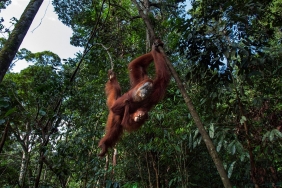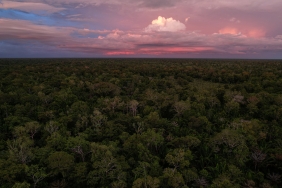MULTI-STAKEHOLDER COOPERATION DOCUMENT FOR THE MANAGEMENT OF TN. BETUNG KERIHUN INAUGURATED
By: Albertus Tjiu
Putussibau (27/04)-As a concrete step in the declaration of Kapuas Hulu as a Conservation District, the Kapuas Hulu District Government facilitated multi-stakeholder cooperation between the Betung Kerihun National Park (TNBK) and its partners, namely WWF-Indonesia and GIZ-FORCLIME Component III. This was marked by the signing of the "Multistakeholder Cooperation" document held on April 27, 2011 at the Kapuas Hulu Regent's Meeting Room, West Kalimantan.
"The Balai Besar TNBK has shown its leadership by cooperating with its potential partners in developing the 800,000 ha TNBK. I strongly encourage this kind of partnership, and hope that this cooperation can be continued with relevant SKPDs in the Kapuas Hulu District Government in an effort to accelerate development, especially in advancing the economy of the people living around and within the TNBK area," said Ir. H. Muhammad Sukri, Regional Secretary of Kapuas Hulu District.
The effort of "Multistakeholder Cooperation in the Management of TNBK Period 2011" is expected to become a model of collaborative management of conservation areas and efforts to improve the welfare of people living in and around conservation areas.
"Through this cooperation, Kapuas Hulu, which has declared itself as a Conservation District and is one of the districts of the initiative to save the Heart of Borneo, can prove that conservation efforts and economic development with sustainable principles can run synergistically," he added.
Meanwhile, the Head of the TNBK Center, Dr. Joko Prihatno, stated that the signing of the document is a very meaningful additional energy in the effort to implement the TNBK management program based on Resort. Multistakeholder cooperation includes four main programs, namely forest protection and security, biodiversity management, community empowerment, and the development of ecotourism and environmental services.
"It is realized that to realize sustainable forests and prosperous communities, synergies with partners are needed, such as orangutan conservation, establishment of belian seed trees, legality of traditional use of forest products by local communities, self-sustaining security and increasing productive businesses of communities around TNBK including nature tourism and micro-hydro electricity, honey, and palm sugar," he continued.
The same thing was also confirmed by WWF-Indonesia West Kalimantan Program Manager M. Hermayani Putera. According to him, as one of the NGOs working in Kapuas Hulu, WWF is proud that the cooperation with the TNBK Center is highly appreciated by the Kapuas Hulu Regional Government.
"This further motivates us to do our best and optimize this collaboration," he said.
Ismet Khaeruddin from GIZ-FORCLIME Program Component III reinforced the previous statement that since Kapuas Hulu declared itself as a Conservation District and the birth of the Heart of Borneo initiative, more and more parties have come to Kapuas Hulu with the aim of supporting the regional development process, especially with regard to the implementation of sustainable development principles. Ismet Khaeruddin also emphasized that in order to guarantee the implementation of the principles of sustainable development, more and more parties are coming to Kapuas Hulu.
He also emphasized that in order to ensure the effectiveness of multi-stakeholder cooperation in providing benefits to the community and the District as a whole, the collaborative synergy needs to be built and implemented strategically and with full commitment.





